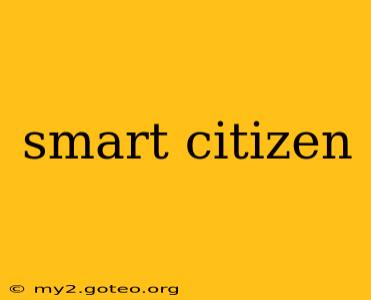In today's complex world, the definition of a "smart citizen" extends far beyond simply obeying laws. It encompasses a proactive engagement with society, a commitment to continuous learning, and a responsible approach to civic participation. This article explores the key qualities and actions that define a smart citizen in the 21st century, addressing common questions and misconceptions along the way.
What are the characteristics of a smart citizen?
A smart citizen is characterized by a blend of intellectual curiosity, active participation, and ethical awareness. They are informed about current events, engage in critical thinking, and contribute positively to their communities. This involves understanding their rights and responsibilities, participating in democratic processes, and respecting diverse perspectives. Furthermore, smart citizens are adaptable, embracing lifelong learning to stay informed and engaged in an ever-evolving world. They are also resourceful, finding ways to contribute even with limited resources, and resilient, persevering in the face of societal challenges.
What is the role of a smart citizen in a democracy?
In a democracy, smart citizens play a crucial role in shaping the future. Their active participation is vital for maintaining a healthy and responsive government. This includes voting in elections, staying informed about political issues, engaging in respectful dialogue with others holding differing viewpoints, and holding elected officials accountable. Smart citizens understand the importance of checks and balances, the separation of powers, and the need for transparency and accountability in governance. They are also vigilant in protecting democratic institutions and values against threats, whether internal or external.
How can I become a more smart citizen?
Becoming a more engaged and informed citizen is a continuous journey. Start by cultivating a habit of reading credible news sources from diverse perspectives, to avoid the echo chamber effect. Attend local council meetings, participate in community initiatives, and engage in respectful dialogue with people who hold different viewpoints. This will broaden your understanding and enhance your ability to participate meaningfully in civic discussions. Take advantage of educational opportunities—online courses, workshops, and community events—to deepen your knowledge on relevant topics. Finally, remember that even small actions, like volunteering your time or reporting civic issues, can make a significant difference.
What are the responsibilities of a smart citizen?
The responsibilities of a smart citizen are multifaceted. They include respecting the law, participating in civic duties like jury service (where applicable), paying taxes honestly, and contributing to the well-being of the community. This also involves actively participating in the democratic process by voting and engaging in political discourse. Furthermore, smart citizens actively work towards environmental sustainability, contributing to a healthier planet for future generations. This might involve supporting environmentally friendly policies, reducing their carbon footprint, or advocating for better environmental protection.
What are some examples of smart citizen actions?
Examples of smart citizen actions are vast and varied. They can range from simple acts like recycling and reducing energy consumption to more significant commitments such as volunteering at a local charity, advocating for policy changes, or running for public office. Actively participating in local community events, engaging in respectful dialogue on social media, and supporting local businesses are all examples of smart citizen engagement. Furthermore, reporting unethical or illegal activities to the appropriate authorities is a crucial responsibility of a smart citizen.
How can technology help make citizens smarter?
Technology plays a significant role in empowering citizens. Access to information online, through news websites, social media, and government portals, allows individuals to stay informed about current events and civic issues. Online platforms facilitate community engagement, enabling citizens to connect with like-minded individuals, participate in online forums and discussions, and organize collective action. Moreover, technology facilitates access to education, with online courses and resources available to expand knowledge and skills. However, it's crucial to be discerning about the reliability of information found online and to cultivate critical thinking skills to avoid misinformation.
In conclusion, being a smart citizen is not a static state but an ongoing process of learning, engagement, and responsible action. By actively participating in our communities, staying informed, and engaging in critical thinking, we can all contribute to a more just, equitable, and sustainable future.

